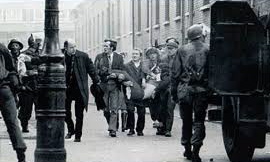Authorities in Northern Ireland have announced plans for a criminal investigation into the killing of 13 civilians by British troops on “Bloody Sunday” in 1972.
An earlier investigation, the Savile inquiry, concluded that soldiers of the Parachute Regiment had opened fire on unarmed Catholic demonstrators in the town of Derry without provocation.
To date no charges have been filed against those responsible for the killings on January 30, 1972.
However it is unlikely that anyone found guilty of the killings would serve long jail sentences, since under the Good Friday agreement of 1998 all crimes committed prior to that time have a de facto amnesty.
The announcement of a new inquiry provoked tensions that survive in Northern Ireland despite the arrival of a stable peace agreement. Unionist leaders questioned why the Bloody Sunday killings should receive special treatment, when violence by the Irish Republican Army is not being reinvestigated.
John Kelly, whose brother Michael was shot dead on Bloody Sunday, said: “It certainly is good news, but it was something we were expecting anyway. My view on it at the time was these soldiers should have been arrested straight away and prosecuted on what came out of the Saville report. But certainly after hearing what we heard today it’s a step in the right direction because myself, my family and most of the families want prosecutions.”
In 2010 British Prime Minister David Cameron issued an apology in the House of Commons, describing what had happened as “both unjustified and unjustifiable”.
Police officials in Northern Ireland said they could not say when the new investigation would begin because it would require about 30 detectives working full-time for at least three years.
Sources:
Image: Global Research
Additional reading
News category: World.




